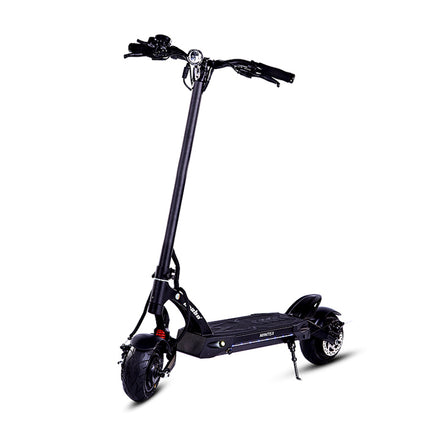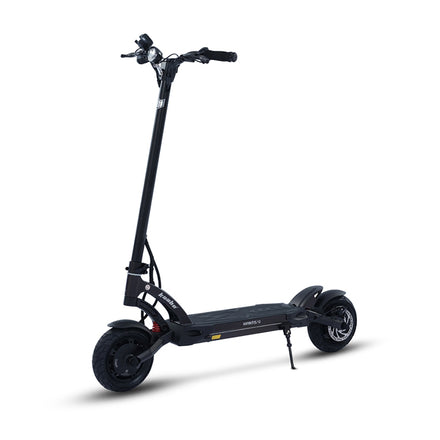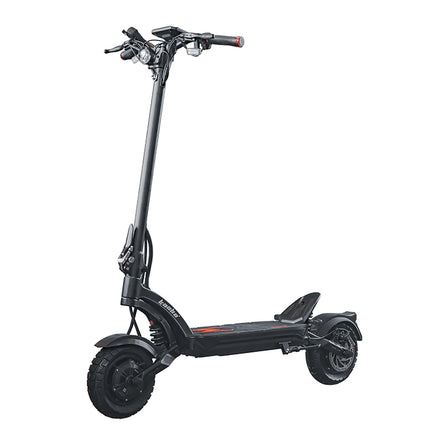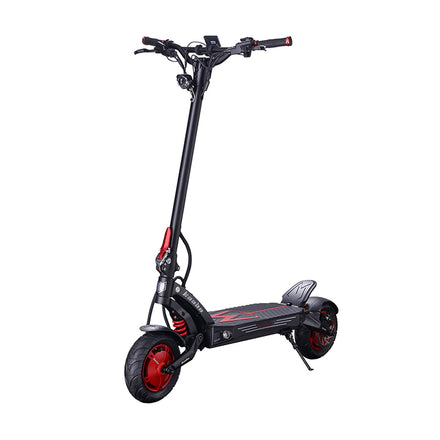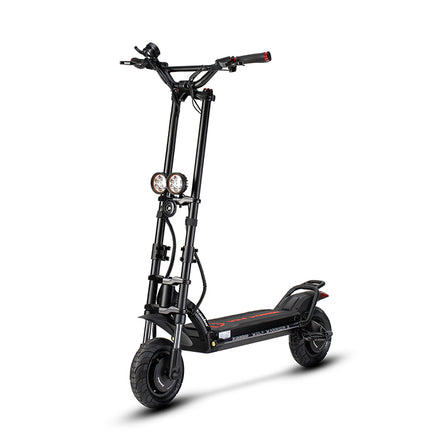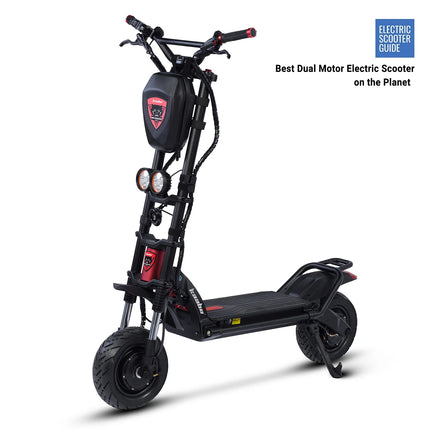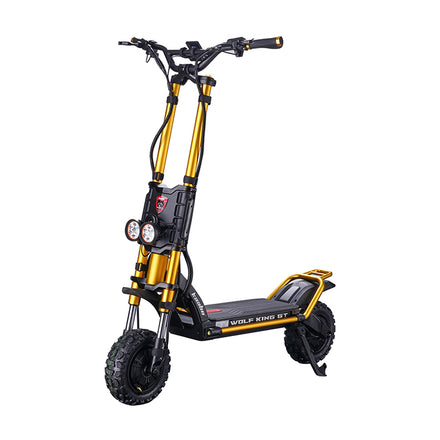U.S. Electric Scooter Laws in 2022
Electric scooters are considered a type of electric personal assistive mobility device (EPAMD), which means they can be ridden on sidewalks, bike paths, and other areas that pedestrians use. In the United States, there is no federal law governing the use of these devices; however, many states and municipalities have their own rules regarding sidewalk riding or even riding on roads.

Street legal electric scooter speed limits
The current max speed limit for a most states is 20 mph (32 kph). A bit unexpected as most share scooters are regulated to do 10-15 mph (16-24 kph). This is nice as 20 mph electric scooter can then offer a clear advantage is many cases and aren't as limited as most of the current shared fleets have.
There are some exceptions. In DC the max speed is 10 mph (16 kph) while in New Jersey it's 19 mph (30 kph). In Michigan and Oregon 25 mph (40 kph).
Scooter Laws By State
Alabama
Alabama made electric scooters legal in 2019, but the state allows cities to create their laws for electric scooter riders. Both Tuscaloosa and Auburn have not made e-scooters legal on public streets, but other cities such as Birmingham have.
All riders require an M License for their scooter, which means people under 14 years old won't use them. Anyone under 16 must wear a helmet, but those above 16 aren't legally required to do so.
Alaska
Electric scooters are under the same laws as electric bikes and mopeds in Alaska. The basic restrictions state that nobody should use an e-scooter above 750 Watts, and 14-15 years old's need an M2 Permit, while people over 16 require an M1 or M3 Permit.
Arizona
Arizona takes a more liberal approach to electric scooters, enabling people to ride them at low speeds on sidewalks and public roads. You also won't need to register your electric scooter, but each model must weigh 75lbs and under, with a maximum speed of 20 miles per hour.
Arkansas
In Arkansas, the Electric Motorized Scooter Act came into effect in 2019. The state requires scooters to weigh no less than 100 lbs, and riders mustn't travel at speeds above 15 mph.
Each locality in Arkansas has the right to mandate scooter-sharing companies and make its own laws - within reason.
California
California law for electric scooters is more explicit, making sense because they're so popular. Users should have a valid driver's license, but they aren't required to register an electric scooter.
If you want to use your e-scooter on a public road, you must travel no faster than 15 miles per hour and stay off the sidewalk. Further to this, anyone under 18 years old must wear a helmet.
Colorado
Colorado lets e-scooters on sidewalks as long as people travel 6mph. You can also ride on public roads if your scooter doesn't exceed 30mph. As you can see, the laws in Colorado are slightly more liberal than in other states.
Connecticut
In Connecticut, people aren't allowed to operate electric scooters on a sidewalk, but they can ride on public roads at speeds of less than 20mph. Furthermore, everyone under the age of 16 must wear a helmet.
Delaware
Delaware is one of the strictest states, and it doesn't let people ride electric scooters on public roads. Despite the state law, some cities take a liberal approach to the law - but you should always check with your local authority.
While the state restricts using e-scooters, it also has a law stating that everyone over the age of 16 must wear a helmet.
Washington D.C.
In Washington D.C., scooters aren't treated as vehicles, so they are classed as personal mobility devices. While people won't need to register their scooter or have a license, the state does restrict riding privileges to people 16 and over.
You also won't be able to use your e-scooter on sidewalks in the business district, but low-speed electric scooters are allowed on most sidewalks - as long as they don't exceed 10mph.
Florida
Florida legalized electric scooters in 2019 but restricted them to riders 16 years old. Scooter riders should use designated bike lanes and ride at a maximum speed of 30mph.
Local authorities aren't allowed to restrict personally owned scooters, but they can make their own rules for shared e-scooters.
Georgia
In Georgia, electric scooters are legal on bike paths and lanes, so users can only use them on public roads if there's no lane available. Riders must also keep to a maximum speed of 20mph, and the weight limit is 100lbs.
Hawaii
Hawaii is one of the states with no actual e-scooter regulations, so it's common to see people riding them everywhere. One reason for this is that the ride-sharing program never really took off in Hawaii, so the authorities didn't need to mandate e-scooters.
Idaho
Idaho is another state with no clear regulations - except for the city of Boise. People can use their scooters on sidewalks and public roads, but while Boise has some rules, it's unclear on the speed limit and scooter weight.
Illinois
Illinois was due to make some changes to its e-scooter laws, but the Covid-19 pandemic slowed the state's implementation of them. In simple terms, e-scooters and bikes are under the same limitations, which state that people under 17 years old must have a license.
Indiana
Indiana uses its bike laws to regulate e-scooters, including riders being able to use their scooters on public paths and roads. In addition to these laws, each electric scooter model must weigh no more than 100lbs and travel at a maximum speed of 20mph.
Iowa
Iowa also removes any ambiguity by treating e-scooters as bikes, with similar laws to Indiana. You can ride an electric scooter on sidewalks, bike paths, and public roads as long as it weighs under 100lbs and has a maximum speed limit of 20mph.
Kansas
In Kansas, people can use e-scooters on public roads but not on sidewalks and highways. All riders must have a valid driver's license, and helmets are recommended - but not a legal requirement.
Kentucky
Kentucky allows people 16 years and over to use electric scooters, and you don't need to register one or have a license. However, the state does require all e-scooters to have a red rear light and headlight for night riding.
Louisiana
In Louisiana, scooters were legalized in 2019. People can use them on sidewalks and any street/road with a speed limit. The scooter must have a maximum speed of 25mph, and riders must stay in line with the speed limit at all times.
Anyone can use electric scooters, but anyone under 17 is legally required to wear a helmet.
Maine
Maine's laws focus more on safety, and while people can use electric scooters, they must make sure they have front and rear lights. Your wheel diameter should be a maximum of 10 inches, and all riders need a license.
Maryland
In Maryland, scooters have a maximum speed limit of 20mph. Lower-speed scooters are classed as bicycles and fall under the same restrictions.
Massachusetts
In Massachusetts, electric scooter riders are classed as other vehicle owners and must protect themselves and others on the road. Anyone using an e-scooter must follow road safety laws and always wear a helmet.
Any driver must have a valid license, and the maximum speed limit is 20 miles per hour.
Michigan
Michigan electric scooter laws are the same as e-skateboard regulations, which state that riders must only ride on streets with a maximum speed limit of 25mph. You cannot use your scooter on roads that exceed a speed limit of 30 miles per hour.
You'll also need to have front and rear lights that can be seen for up to 600 feet, and never try to pass someone in traffic.
Minnesota
Minnesota only legalizes electric foot scooters, with a maximum speed of 15 miles per hour. The wheel diameter must be no more than 12 inches, and all riders under 18 have to wear a helmet.
Surprisingly, anyone over the age of 12 can use an e-scooter, but they need to have at least one year of experience.
Missouri
Missouri has no clear laws on electric scooters and instead uses other laws to mandate them. For example, any scooter with a max speed of less than 30mph falls under the bike category - but those above will fall under motorcycle laws.
Montana
In Montana, electric scooters are legal on public roads, but riders must make other road users aware if they would like to pass them. Further to this, you can't use a scooter on the sidewalk.
Nebraska
Nebraska doesn't have many clear laws for using electric scooters and advises riders to follow other road rules. The only explicit restriction is that e-scooters aren't allowed on sidewalks.
Nevada
Electric scooters are legal in Nebraska, but only for scooters that weigh 100lbs or less. Riders must also be at least 16 years old, and the maximum speed limit of 20 miles per hour applies to everyone.
New Hampshire
New Hampshire has no clear electric scooter regulations as a state, but individual cities can restrict them at their discretion. Due to this, it's advisable to check your local authority's guidelines before using your e-scooter.
New Jersey
Electric scooters are legal in New Jersey, and the rules are relatively liberal. You don't need a license or registration, and high-speed scooters are allowed - as long as you follow the restrictions that apply to bikes.
New Mexico
In Albuquerque, electric scooter sharing is popular, but despite this, New Mexico has no clear state laws. Instead, cities can make their own restrictions - but personal e-scooters aren't as popular in New Mexico as in other states.
New York
New York is one of the biggest e-scooter states, and a lot of this is attributable to the popularity of electric scooters in NYC. The state now regulates private scooters, requiring riders to be at least 16 years old, and anyone aged 18 and under must wear helmets.
The maximum speed limit is 20 miles per hour, and riders must avoid roads with a speed limit of over 30 mph. You also cannot ride on sidewalks.
North Carolina
North Carolina has stricter laws that regard electric scooters as any other vehicle. All e-scooters must have DMV registration, and riders can't go on streets with a speed limit exceeding 25 miles per hour.
North Dakota
North Dakota regards electric scooters as mopeds and therefore mandates them under the same rules. If you want to use an electric scooter, you must ensure it has lights and suitable brakes.
Anyone under 18 must wear helmets, and biking paths along with sidewalks are entirely off-limits.
Ohio
Ohio only legalized e-scooters in 2021, and the state doesn't require riders to have a license or register their scooters. However, you can't use a scooter that exceeds 100lbs and 20 miles per hour. Anyone under the age of 16 isn't eligible to use the scooter.
Oklahoma
Oklahoma as a state has no laws for electric scooter riding, but each city can make its laws. In Oklahoma City, e-scooters can go on roads with a speed limit exceeding 35 miles per hour, which is highly liberal compared to other states.
One thing cities in Oklahoma do take seriously is the minimum age for riders. You have to be at least 18 to use them.
Oregon
Oregon has no specific electric scooter legislation, and the city of Portland regards them as mopeds. Riders can't use their scooters on sidewalks and must stay under the speed limit of 15 miles per hour.Further to this, e-scooter users must be at least 16 years old. The rules might be different in other cities, so it's always best to check with your authority.
Pennsylvania
In terms of Pennsylvania e-scooter laws, there is a lot of ambiguity and confusion surrounding whether people can use them. The Pennsylvania Transportation Committee doesn't regard e-scooters as compliant but does consider segways as electric transportation.
Basically, there are no clear guidelines for e-scooters, so it's best to check with your local authority.
Rhode Island
Rhode Island has different regulations depending on the city you reside in. Providence requires driver's licenses, and riders can use the scooter on the road and sidewalks.
South Carolina
Both Charleston and Columbia have issued bans on e-scooter sharing schemes, but other cities in South Carolina allow them. The rules are unclear on privately owned scooters, but each city can make its own legislation.
South Dakota
South Dakota uses moped laws to regulate e-scooters, and the most common restrictions involve riders needing a license and insurance. People are also expected to wear protective gear if they're under 18.
Tennessee
In Tennessee, e-scooters are regarded as bikes, and most cities don't allow people to ride on the sidewalk. In addition, scooters must weigh no more than 100lbs and should have good brakes and taillights.
Texas
Texas regulates the use of e-scooters on roads with speed limits exceeding 35 miles per hour, but electric transportation is prevalent throughout the state - especially in colleges.
Riders don't need insurance, and scooters are also exempt from registration.
Utah
In Utah, people can use e-scooters anywhere bikes are allowed, but they can't exceed 15 miles per hour. Anyone under 15 years old should have adult supervision.
Vermont
Each city in Vermont can make its laws, but e-scooters are considered vehicles in the state, so only road use is permissible. Some cities, such as Burlington, have a 15-mile-per-hour speed limit.
Virginia
Virginia also allows cities to further mandate e-scooters, but the state laws require scooters to be no heavier than 100lbs with a maximum speed of 20 miles per hour. People must be at least 14 years old, and nobody can use electric scooters on the highway.
Washington
Washington allows scooters with a speed of 15 miles per hour on roads and bike paths. Each city can make its laws regarding sidewalk riding and the minimum age, but you must use reflectors at night.
West Virginia
In West Virginia, there are no set laws for e-scooters at this time, but the state does mandate e-bikes, which suggests that they'll use the same restrictions for e-scooters in the near future.
Wisconsin
Wisconsin states that no scooter should exceed 20 miles per hour, but each local authority has the right to set its laws. Riders should also never use the sidewalk unless they have to.
Wyoming
In Wyoming, e-scooters don't require a license or registration, and local authorities treat them as e-bikes and electric skateboards. The speed limits depend on each city's local requirements.
Closing comments
Before you decide to ride a privately owned kaabo electric scooter anywhere in America, first check the local laws and the specific rules and regulations of the state and city you are in. While some states are to be commended for clarifying the lines on what is and isn’t allowed on an e-scooter, not all 50 states have reached the same level yet.
Do some research at the state, county, and local levels before you rent or purchase a scooter of your own. If the laws aren’t clearly defined, see if you can reach out to your legislators or any local groups advocating for clear laws to be made.
As always, remain safe above all else, and have fun while you ride!
Related Product
Newletter
Promotions, new products and sales. Directly to your inbox.
Lastest Blog Post








